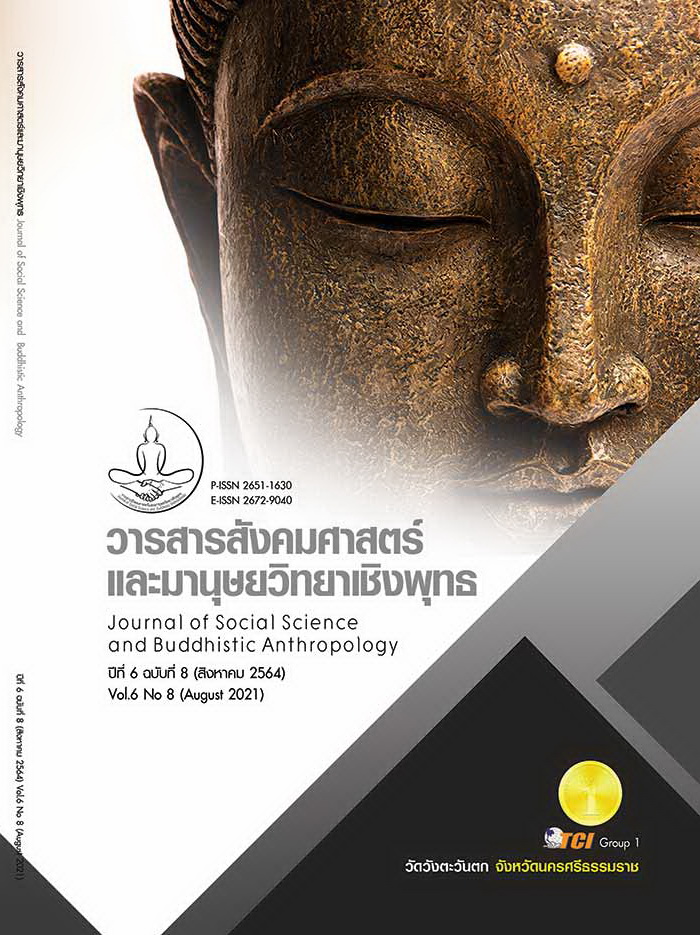THE DEVELOPMENT OF COLLABORATION SKILLS, TEAMWORK SKILLS AND CROSS-CULTURAL LEADERSHIP SKILLS FOR THE YOUTHS IN PAKROR SUB-DISTRICT, SONGKHLA PROVINCE
Keywords:
Collaboration Skills, Team Work, Cross - cultural Leadership, YouthAbstract
The Objectives of this research article were to examine the effects of promoting collaboration skills, teamwork skills and cross-cultural leadership skills among young people in Pakror sub-district. This mixed method research The participants were 98 young people who participated in the training programme, "The development of collaboration skills, teamwork skill, and cross-cultural leadership skill for youth in Pakror sub-district”. The research tools were 1) the training programme and 2) the programme evaluation form. The data was analysed using percentage and mean values. The results of the programme evaluation showed that the majority of the participants agreed on the highest levels that the training programme provided the youth with the understanding of; principles of developing youth leadership skills ( = 4.39); the characteristics of creative, collaborative, and team work leadership (
= 4.62); the usage of information technology to support and develop leadership, collaborative, and teamwork skills (
= 4.46) and the ‘know-how’ to start inventing the project (
= 4.55). Additionally, the participants agreed, to some extent, that this project provided them with some various advantages in developing leadership skills. This is to say, the participants claimed that they had developed to be more assertive (
= 4.60), to build more self-confidence (
= 4.49), to be more empathetic (
= 4.41), to develop the teamwork skills (
= 4.56), to take more on responsibility (
= 4.46), to become more patient person (
= 4.37), to develop more positive human relation (
= 4.55), to have better problem solving skill (
= 4.43). Agreed on the highest level with the mean of 4.68, the participants claimed that they have grown more on public mind. Lastly, the participants’ overall satisfaction level was on highest level with the mean of 4.67. They also required the project to be held every year.
References
กันย์ธนัญ สุชิน และคณะ. (2557). การเสริมสร้างศักยภาพของผู้นำเด็กและเยาวชนในชุมชนเทศบาลตำบลบ้านดู่ อำเภอเมือง จังหวัดเชียงราย. วารสารวิจัยเพื่อการพัฒนาเชิงพื้นที่, 6(5), 76-93.
เกรียงศักดิ์ เจริญวงศ์ศักดิ์. (2551). สร้างภาวะผู้นำในเด็กและเยาวชน. เรียกใช้เมื่อ 22 มีนาคม 2563 จาก http://www.kriengsak.com/node/548
ทัศนพรรณ จิรารักษ์ และคณะ. (2559). การพัฒนาหลักสูตรฝึกอบรมเพื่อเสริมสร้างภาวะผู้นำนักเรียนระดับมัธยมศึกษาตอนต้น ในโรงเรียนสังกัดสำนักงานเขตพื้นที่การศึกษาประถมศึกษาสกลนคร เขต 1. วารสารบัณฑิตศึกษา มหาวิทยาลัยราชภัฏสกลนคร, 13(63), 77-84.
ทิศนา แขมมณี. (2553). ศาสตร์การสอน: องค์ความรู้เพื่อการจัดกระบวนการเรียนรู้ที่มีประสิทธิภาพ (พิมพ์ครั้งที่ 13). กรุงเทพมหานคร: สำนักพิมพ์แห่งจุฬาลงกรณ์มหาวิทยาลัย.
นิจปภา อ่อนอ้าย และนันทรัตน์ เจริญกุล. (2561). แนวทางการบริหารกิจการนักเรียนโรงเรียนจันทราพระกิตติคุณ ตามแนวคิดภาวะผู้นำเชิงสร้างสรรค์. OJED, 13(2), 304-315.
ปฏิมา นรภัทรพิมล และคณะ. (2561). การพัฒนาภาวะผู้นำของคณะกรรมการสภานักเรียนระดับมัธยมศึกษา กรณีศึกษาโรงเรียนประชารัฐธรรมคุณ สังกัดสำนักงานเขตพื้นที่การศึกษามัธยมศึกษาเขต 35. วารสารมนุษยศาสตร์และสังคมศาสตร์ มหาวิทยาลัยราชภัฏอุบลราชธานี, 9(1), 306-319.
รังสรรค์ ประเสริฐศรี. (2551). ภาวะผู้นำ. (พิมพ์ครั้งที่ 2). กรุงเทพมหานคร: เอ็ดบุ๊คเซ็นเตอร์.
ศักดิ์สิทธิ์ หัสมินทร์ และคณะ. (2560). สภาพปัญหาและแนวทางการพัฒนากิจกรรมการสร้างภาวะผู้นำเยาวชนอาเซียนสำหรับนักเรียนระดับมัธยมศึกษาตอนปลาย. วารสารราชพฤกษ์, 15(2), 44-52.
สุปราณีวิ์ ขวัญบุญจันทร์ และคณะ. (2557). การพัฒนาตัวบ่งชี้ภาวะผู้นำสู่อาเซียนของนิสิตคณะพลศึกษา. วารสารคณะพลศึกษา, 17(1), 1-14.
สุวิทย์ สลามเต๊ะ. (2561). การพัฒนาหลักสูตรการฝึกอบรมภาวะผู้นาเด็กและเยาวชนของศาลเยาวชนและครอบครัวเพื่อการป้องกันการติดยาเสพติด. วารสารวิชาการมหาวิทยาลัยธนบุรี, 12(29), 93-106.
สุเวศ กลับศรี. (2557). ภาวะผู้นำที่ควรพัฒนาในเยาวชน. วารสารนาคบุตรปริทรรศน์ มหาวิทยาลัยราชภัฏนครศรีธรรมราช, 6(2), 132-140.









